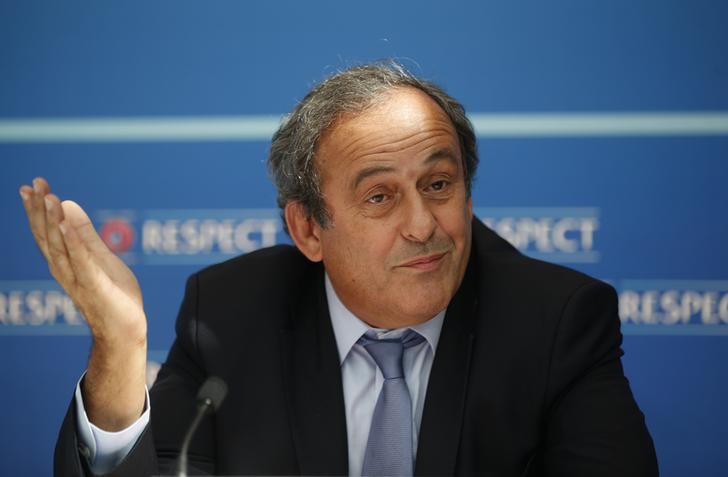
Reuters
UEFA President Michel Platini attends a news conference after the draw for the 2015/2016 UEFA Europa League soccer competition at Monaco’s Grimaldi Forum in Monte Carlo, Monaco August 28, 2015. REUTERS/Eric Gaillard/Files

Reuters
UEFA President Michel Platini attends a news conference after the draw for the 2015/2016 UEFA Europa League soccer competition at Monaco’s Grimaldi Forum in Monte Carlo, Monaco August 28, 2015. REUTERS/Eric Gaillard/Files
By Mike Collett
Watch What’s Trending Now!
LONDON (Reuters) – UEFA chief Michel Platini opened the door to an expanded Euro 2016, with more finalists than ever, but in one of the great ironies of modern European soccer he will be absent when delegates descend on Paris next week.
Platini is serving a 90-day provisional suspension from football, imposed by FIFA’s ethics committee concerning an alleged payment authorised by the president of world soccer’s governing body, Sepp Blatter, who is also banned.
ADVERTISEMENT
So when the coaches from the 24 finalists arrive under heavy security following last month’s Paris attacks for the draw in the French capital on Dec.12, Platini will probably be watching events unfold on television instead of being there.
The 60-year-old Frenchman, synonymous with his country’s Euro ’84 triumph on home soil as a player and chief organiser of the 1998 World Cup which ended in French glory in Paris, was widely criticised when UEFA expanded the finals from “the perfect number” of 16 to 24 teams six years ago.
Many berated him for reducing the qualifiers to a run-in for the major nations, but that is not how it turned out. The Netherlands, World Cup semi-finalists last year, failed to qualify after losing home and away to Iceland in their group.
ADVERTISEMENT
“The decision to expand was taken in the interest of promoting and developing football across Europe,” Platini, the head of European soccer’s ruling body, told Reuters in June.
“We have been delighted with the positive impact the new format has had across the continent.
ADVERTISEMENT
“We have seen extremely competitive groups with several teams fighting for qualification, a high quality of football played and great enthusiasm in several nations who have never or rarely qualified for a major tournament,” he added.
“The qualifiers have been a success so far and we are sure the final tournament in France next year will be the most competitive to date.”
ADVERTISEMENT
FIRST TIME
Among those who have reached the finals are first time qualifiers Albania and Iceland, Wales – back in a major tournament for the first time since the 1958 World Cup – Northern Ireland and Hungary, who both last appeared in a major tournament at the 1986 World Cup in Mexico.
Apart from the Dutch, the usual heavyweights are in place with holders Spain seeking a record third straight title.
Hosts France, designated in position A1 in the draw, will open the tournament at Saint-Denis on June 10, before playing in Marseilles five days later and in Lille on June 19. If they win Group A their round of 16 match will be in Lyon on June 26.
ADVERTISEMENT
With France already allocated A1, there are five other top seeds with Spain, world champions Germany, highly-fancied Belgium, England, the only team to win all of their 10 qualifiers, and Portugal among the elite group.
There are some dangerous floaters in Pot 2 with Italy, Russia and the newly-invigorated Austria, the teams to avoid.
The 24 teams will be split into six groups of four with the top two in each section and the four best third-placed teams advancing to the last 16, leaving eight teams eliminated after the group stage. The final will be in Paris on July 10.
ADVERTISEMENT
(Reporting by Mike Collett; Editing by Ken Ferris)
ADVERTISEMENT
ADVERTISEMENT
ADVERTISEMENT

